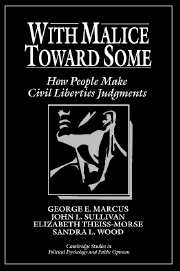Book contents
- Frontmatter
- Contents
- List of Figures and Tables
- Preface: Political Tolerance and Democratic Life
- PART I Theoretical Background and Overview
- PART II Contemporary Information and Political Tolerance Judgments
- PART III Refining the Model – The Role of Antecedent Considerations as Individual Differences
- PART IV Implications and Conclusions
- Appendix A: Hypothetical Group Scenarios and Manipulations
- Appendix B: Methodological Approaches and Scales
- Notes
- References
- Index
PART III - Refining the Model – The Role of Antecedent Considerations as Individual Differences
Published online by Cambridge University Press: 05 August 2012
- Frontmatter
- Contents
- List of Figures and Tables
- Preface: Political Tolerance and Democratic Life
- PART I Theoretical Background and Overview
- PART II Contemporary Information and Political Tolerance Judgments
- PART III Refining the Model – The Role of Antecedent Considerations as Individual Differences
- PART IV Implications and Conclusions
- Appendix A: Hypothetical Group Scenarios and Manipulations
- Appendix B: Methodological Approaches and Scales
- Notes
- References
- Index
Summary
Our previous section established that predispositions, standing decisions, and contemporary information all contribute to tolerance judgments. What we have described to this point is people's aggregate response, yet we know that differences exist among individuals. For example, when confronting contemporary information, a person who is very thoughtful and politically aware will respond differently than someone who is less thoughtful and politically ignorant. Such differences may affect how people make tolerance judgments in a number of dimensions, which we explore in this section.
Chapter 5 focuses on the key issue of threat. While threatening contemporary information is part of our basic model, it also seems likely that certain individuals may have a propensity to feel threatened. We highlight two types of threat. First, we examine threat as a predisposition, that is, as a generalized tendency to perceive the world as dangerous. Second, we examine threat as a belief that a particular disliked group is highly threatening. Both are significantly related to tolerance judgments.
Chapter 6 turns to a discussion of the paradoxical nature of democratic norms. Most people support abstract democratic principles, but fail to support the civil liberties claims of noxious groups. In this chapter, we focus on democratic principles in two ways. First, we report the results of another experiment to explore whether information about the meaning of democratic principles matters in the contemporary environment. Second, we compare individuals who are strong and weak in their support for democratic principles, because it seems likely that those who strongly support democratic norms would not change their views in response to contemporary information.
- Type
- Chapter
- Information
- With Malice toward SomeHow People Make Civil Liberties Judgments, pp. 99 - 100Publisher: Cambridge University PressPrint publication year: 1995



